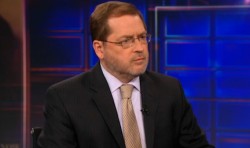Pairing A Carbon Tax With Income-Tax Cut Wouldn't Violate GOP No-Tax-Hike Pledge
 In a step that may help crack open the partisan impasse on climate change, Grover Norquist, the influential lobbyist who has bound hundreds of Republicans to a pledge never to raise taxes, told National Journal that a proposed “carbon tax swap”—taxing carbon pollution in exchange for cutting the income tax—would not violate his pledge.
In a step that may help crack open the partisan impasse on climate change, Grover Norquist, the influential lobbyist who has bound hundreds of Republicans to a pledge never to raise taxes, told National Journal that a proposed “carbon tax swap”—taxing carbon pollution in exchange for cutting the income tax—would not violate his pledge.Norquist’s assessment matters a lot, and could help pave the way for at least a handful of Republicans to support the policy. Over the past six months, a growing number of conservative voices, including former Republican officials and renowned economists, have amped up pressure on their party to finally address climate change.
Lots of folks have been jumping on the carbon tax band-wagon. The Washington Post editorial board boarded this weekend.
Even a modest carbon tax can deliver serious revenue. The two key questions are:
1.Is a tax politically feasible?
2.Is the politically feasible tax environmentally meaningful?
I’ll address the second question in detail in a later post. But for now I’ll point out that any tax in the $15 to $25 a ton of CO2 range (together with other policies already enacted, such as the fuel economy standards) would almost certainly achieve a CO2 cut greater than 17% by 2020 (compared to 2005 levels). That 17% cut was Obama’s pledge going into the Copenhagen climate talks. I think that any such U.S. carbon tax would have a transformational effect on global climate talks. Indeed I imagine a significant fraction of the nations of the world would probably seriously consider adopting whatever carbon tax the United States adopts.
It’s been fairly clear that the only way you could get a carbon tax is if you could give Republicans something they wanted more in return. That is, the carbon tax has to make the debt and tax reform deal easier not harder — since obviously that deal is monumentally difficult already, without introducing the climate issue. So, some sort of swap made sense.
The biggest obstacle has been Norquist’s infamous “no new taxes” pledge taken by the overwhelming majority of Republican members of Congress:
The problem is that creating a new “energy tax” would be viewed by some as political suicide. And Republicans who have signed Norquist’s pledge would be barred from supporting it.
That’s where the “swap” side of the policy comes in: The new carbon tax would be paired with a cut in the income tax—something Republicans have long sought. The idea essentially would be to cut the tax on income and move it over to carbon pollution—keeping the proposal revenue-neutral.
“It’s possible you could structure something that wasn’t an increase and didn’t violate the pledge,” Norquist told National Journal.
That qualifies as a bombshell.
Norquist himself doesn’t like the tax, but he misunderstands the politics I think:
“If the Democrats thought it was a good idea and the country wouldn’t hate them for it they would have done it in 2009,” when their party held majorities in both chambers of Congress, he said.
Still, if the tax swap could indeed be structured in such a way that it wouldn’t violate Norquist’s pledge, it could remove at least one political obstacle for some Republicans.
Uhh, Grover, the Democrats thought that something far more complicated was a good idea: a cap-and-trade system that extended out 40 years (far further in the future than any other country in the world had ever contemplated a domestic carbon bill) — and it ultimately would have required a very high carbon price, far higher in, say, 2040 than one would contemplate for just a 10 year budget deal.
The point Norquist seems to miss is that if a carbon tax were part of a bipartisan budget deal that truly put our debt and deficit trajectory on a more sustainable path, everyone involved would have political cover to make politically difficult choices:
“We hear frequently, constantly from Republican lawmakers who say, we see climate change as a huge problem and we want to talk about ways to do this, but for now they’re afraid to talk about it, because of the political repercussions,” said Rob Sisson, president of the group ConservAmerica, formerly Republicans for Environmental Protection.
You can return to the main Market News page, or press the Back button on your browser.

